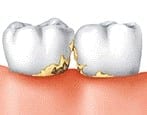You can have perfectly straight, white teeth and still be in danger of losing your smile. Most people who lose their teeth do so because of gum disease.
Gum Disease Symptoms
The most common signs of gum disease can be subtle and easy to miss. One of the most important reasons for regular dental care (such as cleanings every six months) is so that your dental hygienist can monitor your oral health for signs of gum disease. In some cases, the only way to detect gum disease in the early stages is through x-rays.
If you experience any of the following signs and symptoms, schedule an appointment right away. These symptoms may indicate that you have advanced gum disease, and may require aggressive treatment to save your teeth:
- bleeding gums
- gums that are swollen, tender or seem more red than usual
- “gaps” or spots where your gums have pulled away from the tooth structure
- pus that appears when you press on your gums
- persistent bad breath that does not seem to respond to treatment
- permanent teeth that are moving, or loose
- any change in the fit of a partial denture or in the way your teeth come together when you bite down.

This diagram helps illustrate the hidden damage caused by gum disease. The tissue on the left side of the diagram is healthy and normal, while the tissue on the right is diseased. Notice that the signs or symptoms that would be visible to most lay people are quite subtle and easy to miss.
The reduced bone level below the gumline would cause the tooth to feel loose in its socket. Visible tartar is also a sign that you are in need of a cleaning, as tartar buildup contributes greatly to the development of gum disease.
 Tartar buildup on teeth is extremely difficult to control without the help of regular cleanings, and it is a major factor in the development of gum disease. For this reason alone, regular cleanings are very important. If tartar buildup gets out of control, deeper cleaning treatments might be necessary, and they can be expensive, time-consuming, and quite uncomfortable.
Tartar buildup on teeth is extremely difficult to control without the help of regular cleanings, and it is a major factor in the development of gum disease. For this reason alone, regular cleanings are very important. If tartar buildup gets out of control, deeper cleaning treatments might be necessary, and they can be expensive, time-consuming, and quite uncomfortable.
Maintaining oral health is about a lot more than keeping your smile beautiful. The most current research results indicate that oral health is intrinsically linked to overall health. Gum disease and other oral health issues have been associated with diabetes, cardiovascular disease, and Alzheimer’s disease.